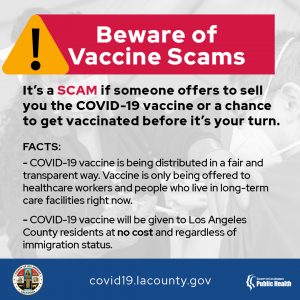It’s a holiday season like no other, but one thing remains constant: scammers are looking to take advantage of unsuspecting consumers. The Los Angeles County Department of Consumer and Business Affairs is receiving reports of many holiday scams, some brand new and many holdovers from years past.
Follow these tips to keep your days a bit more merry and bright:
Online Shopping Fraud
In recent years, more consumers have turned to online retailers for holiday shopping. This year, with our current health emergency, shopping online is more popular than ever, which makes it even more important that consumers use good online habits. To protect yourself from fraud while shopping online, be sure to buy from websites you know and trust, keep your personal information safe by using strong passwords and two-factor authentication, and don’t overshare on social media.
Porch Pirates
All that online shopping means more packages are being delivered, giving thieves more opportunities to steal your goods. Protect your porch with these simple steps:
- Give detailed delivery instructions: Many online retailers allow you to give detailed instructions to delivery drivers. If you will be home, you can sometimes request a physical signature be required for delivery. You can specify where you want deliveries to be left, such as a backdoor, behind a pillar, or even with a neighbor. Or you can ask for delivery confirmation via email or text.
- Light up the porch: A brightly-lit porch might keep thieves away. Use motion-sensor lights so you, or your trustworthy neighbors, can see when packages arrive.
Fraudulent Puppy Peddlers
Because we are all spending more time at home and apart from family and friends, more people are seeking companionship from a pet. Sadly, pet scams are also increasing, mostly through online sellers.
To avoid online pet scams:
- Ask to see the pet in person before you exchange any money. If you can’t see the pet in person, ask for live video. No live video? Ask for recorded video. Scammers will often avoid all of this, asking you to rely only on photos and descriptions.
- If you get a photo of the pet, use a reverse image search to see if that exact photo shows up elsewhere. Do the same with description. Copy and paste the exact wording into your browser and search for it. In a scam, those photos and descriptions might be used to try and dupe multiple would-be buyers.
- Never pay by wiring money or unusual methods like gift cards. If you pay with your credit card, check your account closely and dispute suspected fraud.
- A better choice is to bypass online seller altogether and adopt your next companion instead. Check your local animal shelters, adoption centers, and pet rescues for available pets in need of love and a new home.
COVID-19 Vaccine Scams
The good news is the COVID-19 vaccine has become available and is currently being administered to our frontline healthcare workers. However, the Department of Public Health states that most of the public will not receive a vaccine until Spring 2021. While we wait, scammers will be making their move to take advantage of eager consumers.
Keep in mind:
- You can’t pay to get on a list to receive the vaccine.
- You can’t pay to get early access to the vaccine.
- If you get a call, text, email, or a knock on your door with someone claiming you can receive early access to the vaccine, it’s a scam. Don’t waste your money or give away personal information, such as your Social Security number, bank account or credit card information.
Phony “Santa Letters” Scam
The Los Angeles City Attorney’s office has warned about a unique scam this year where consumers are being offered “handwritten letters from Santa Claus” for around $20.
While it’s difficult for parents and children to miss their yearly visit to Santa, think twice before you give up $20 – or worse, your credit card information – to a stranger looking to take advantage of this unusual Christmas.
Phony Facebook “Christmas Bonus” Scam
The Identity Theft Resource Center has identified a new scam where Facebook users receive messages from “friends” on their contact lists about winning a “Christmas bonus.” Scammers, using the cloned accounts of friends, will ask for personal information or a small “transfer fee” to deliver the winnings. This is a new spin on a classic sweepstakes scam. Remember, if you win money, you shouldn’t be the one paying. Typically, once they receive your “fee” or personal information, the scammers will disappear along with your money.
Phony Gift Exchange Scam
The L.A. City Attorney also warned about growing scam involving a would-be gift exchange. In this scam, you receive a friendly invitation to sign up for a gift exchange with strangers. Just give your name, address and other personal information and tag a few of your friends. You are then asked to send a small gift to a stranger. Unfortunately, that’s where it ends for some people who get nothing in return as promised. This is a new spin on a classic pyramid scheme, where more people get involved, but just a select few reap the rewards. Stick to gift-giving with people you know.
Charity Scams
If you choose to give to charity, make sure your money goes to the right place. Stick with charities you know and trust and have the infrastructure in place to truly help. If you’re not sure about a charity, ask for information in writing, check their website or look up their information with the State of California to make sure they are legitimate.
Have a happy and safe holiday season.

